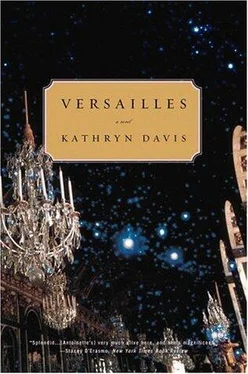Kathryn Davis - Versailles
Здесь есть возможность читать онлайн «Kathryn Davis - Versailles» весь текст электронной книги совершенно бесплатно (целиком полную версию без сокращений). В некоторых случаях можно слушать аудио, скачать через торрент в формате fb2 и присутствует краткое содержание. Год выпуска: 2003, Издательство: Back Bay Books, Жанр: Историческая проза, на английском языке. Описание произведения, (предисловие) а так же отзывы посетителей доступны на портале библиотеки ЛибКат.
- Название:Versailles
- Автор:
- Издательство:Back Bay Books
- Жанр:
- Год:2003
- ISBN:нет данных
- Рейтинг книги:4 / 5. Голосов: 1
-
Избранное:Добавить в избранное
- Отзывы:
-
Ваша оценка:
- 80
- 1
- 2
- 3
- 4
- 5
Versailles: краткое содержание, описание и аннотация
Предлагаем к чтению аннотацию, описание, краткое содержание или предисловие (зависит от того, что написал сам автор книги «Versailles»). Если вы не нашли необходимую информацию о книге — напишите в комментариях, мы постараемся отыскать её.
Versailles — читать онлайн бесплатно полную книгу (весь текст) целиком
Ниже представлен текст книги, разбитый по страницам. Система сохранения места последней прочитанной страницы, позволяет с удобством читать онлайн бесплатно книгу «Versailles», без необходимости каждый раз заново искать на чём Вы остановились. Поставьте закладку, и сможете в любой момент перейти на страницу, на которой закончили чтение.
Интервал:
Закладка:
My windows slightly open and facing south — even the mildest breeze carried with it the smell of orange blossoms. Southern light, light from the Midi, turning the crystal facets of my chandeliers to honey. I was the Queen of France! The Queen of France, bathing her soft white body (chastely hidden under a flannel gown) in her swan-shaped tub on wheels. The Queen of France donning her taffeta wrapper and dimity slippers, before returning to bed for a breakfast cup of chocolate and a breakfast roll, Eggplant curled adoringly at her feet.
Then the door leading to the Salon of the Nobles would fly open (letting in a faint whiff of stink from those endless unlit hallways where the lowest of the low tunneled their invisible way throughout the chateau) and the parade would begin. Abbé Vermond with some tiresome piece of state business, or occasionally a letter from my mother. "Madame my dear daughter" — for so she addressed me—"They say one cannot tell the Queen from the Princes, that they are shockingly familiar with you…" And who might be this they who told her that? None other than Count Florimund Mercy d'Argentau, blabbermouth Austrian envoy to the court, planted there by Madame my dear mother, and otherwise known as Mercy.
Next my two brothers-in-law, the so-called familiar Princes of the Blood, fat pedantic Provence, and elegant witty Artois (whose observation that there was only one King of France, and that was the Queen, Mercy couldn't let slip to my mother fast enough), followed by the little Princesse de Lamballe, a pretty but not especially bright widow of two and twenty, who would wring her unnaturally gigantic hands and burst into tears at the least provocation, a trait I willfully mistook for warmheartedness, so eager was I to have a girlfriend more or less my own age. All of them sitting there watching me drink my chocolate and eat my roll, Vermond stiffly, Provence hungrily, Artois somewhat salaciously, as the Princesse de Lamballe discreetly blew her nose. A tableau I often found myself studying in the immense mirror on the opposingwall, where all of us appeared ludicrously small in comparison to the furniture, like dolls made to live in the wrong size dollhouse.
At some point the toilet table would be rolled in and the Grande Toilette would commence, during which Monsieur Léonard would do my hair while a crowd of high court officials, including those ill-dressed hags pushing forty I'd made the mistake of referring to as "bundles," looked on, their panniers mashed together. Initially they came to ooh and aah and garner fashion tips, but eventually, I'm sony to say, their chief objective was to compile evidence against me, and not just (as I thought) because I was so much better looking, even with my hair in curling papers, but also (as my mother had to keep on reminding me) because I was Austrian.
As if marrying Louis could undo centuries of enmity between our two countries. As if I had always been, was, and would always be Antonia, never Antoinette. As if on the stroke of twelve I could remove my face the way I'd remove my mask at a ball, revealing my true monstrous aspect.
Or, as the pamphleteers wrote:
Little Queen of twenty-one,
If you don't stop making fun,
We'll kick you straight back home.
After Léonard took off the curling papers, he frizzed my hair with a hot iron, combed it out with nettle juice, powdered it with bean flour, then mounted a ladder in order to affix the horsehair cushion that would form an armature for the final hairdo.
Cypresses and black marigolds and wheat sheaves and fruit — filled cornucopias — a hairdo reminding everyone that while they mourned the loss of one King, they also looked forward to the bounty the next would bring. Or how about the Inoculation Hairdo, commemorating the Princes' victory over smallpox? One day Léonard made me Minerva. One day he made me an English garden with lawns, hills, and streams. One day he made me the world.
Really, you could put anything on your head your head your head… so long as it didn't (excuse me) snap your neck.
Léonard used long steel pins to hold the cushion in place and combed my own hair up over it. Then he matted everything down with pomade, creating a kind of moist hive under which fleas and lice bred, and soon enough there wasn't a fashionable lady alive who wasn't using a long thin stick identical to the one Léonard made for me, complete with a little ivory claw, to scratch away at her scalp like mad.
Whatever I did, everyone wanted to do; whatever I wore, everyone coveted. First they wanted to copy me, then they began to hate me.
But, comme on dit, one must suffer to be beautiful.
It took forever, the royal lever.
By the time Louis got there he'd have been up for hours, hammering away on his forge, shooting at cats, or watching the arriving guests through his telescope. My poor dear Louis, squinting his pale blue nearsighted eyes in an effort to locate me within that thicket of courtiers and under that mountain of hair. Smiling with delight when he finally did, while attempting to appear cool and detached.
"Bonjour, la Reine," he would say. Never one for nicknames or wordplay of any sort, my Lou-Lou, drawing up his chair, companionable. After our initial awkwardness, once we got the fact out of the way that two people couldn't possibly have less in common than a reclusive locksmith and his impudent wife, we actually became quite close, more or less along the lines of Aphrodite and Hephaestus. Just as the pamphleteers would later suggest, aiming merely to hurt but none theless hitting the target, in that vexing way that cruelly can sometimes approximate truth.
So sweet, my Louis. What was he doing in that nest of vipers?
"I had a dream," I recall him once confiding. "It was in another century, but the doors opened and shut the same way."
Doors
There were more than two hundred ways to get in and out of Versailles, not counting windows. Of course the door you used depended on who you were: for instance, the kitchen gardener's third assistant's lackey, delivering cherries, would have entered through a so-called Dutch door located at the nethermost tip of the south wing; whereas the rakish Due de Lauzun liked to sneak in through a door of the type that would come to be known as French, off the Large Reception Room; and the Archduke Maximilian, arriving for a visit in February of 1775, waddled in through one of three imposing gilt-grilled doors on the south wall of the Marble Court. This was the Queen's brother — her dear little Maxie — who had, as a child of three, decked out in a blue velvet coat, white twill breeches, and white silk stockings, transported guests with his ability to recite Italian verse from memory, but who had become, at fifteen, no longer cute.
February. Low gray skies and a dusting of snow. Snow disturbed by the carriage wheels, like bean flour in a draft. The Archduke rides with his head hanging out the window and his mouth open, catching snowflakes on his tongue. Both he and his sister adore snow and always have. When Antoinette was a little girl she told him she was made of snow, and he couldn't sleep, terrified that he'd come into her room in the morning and find nothing but a puddle.
Definitely not cute, the Archduke Maximilian — slow, rather, and grossly fat, as well as harelipped and given to "smudging" his consonants — though that's hardly reason for the Princes of the Blood to cut him, as they do. No sooner has he huffed and puffed his way up among the noisy stinking throng of courtiers and servants and messengers and sedan chairs crowding the Queen's Staircase, barely escaped the humiliation of walking smack into a trompe I'oeil vista at the head of the stairs, negotiated the narrow corridor that gives through an arcaded opening onto the Room of the Queen's Guard, made his way past the series of ornate gilt-painted doors that lead from the Queen's Antechamber to the Salon of the Nobles and into the Queen's Bedchamber, than Provence and Artois have hightailed it out the door at the rear of the bedroom, into the Salon of Peace and thence through the Hall of Mirrors (a million ungainly Provences, a million handsome Artoises) to the King's Bedchamber, where they collapse on a sofa in its winter upholstery of thick red velvet embroidered with over a hundred and twenty pounds of gold thread and break out laughing.
Читать дальшеИнтервал:
Закладка:
Похожие книги на «Versailles»
Представляем Вашему вниманию похожие книги на «Versailles» списком для выбора. Мы отобрали схожую по названию и смыслу литературу в надежде предоставить читателям больше вариантов отыскать новые, интересные, ещё непрочитанные произведения.
Обсуждение, отзывы о книге «Versailles» и просто собственные мнения читателей. Оставьте ваши комментарии, напишите, что Вы думаете о произведении, его смысле или главных героях. Укажите что конкретно понравилось, а что нет, и почему Вы так считаете.












